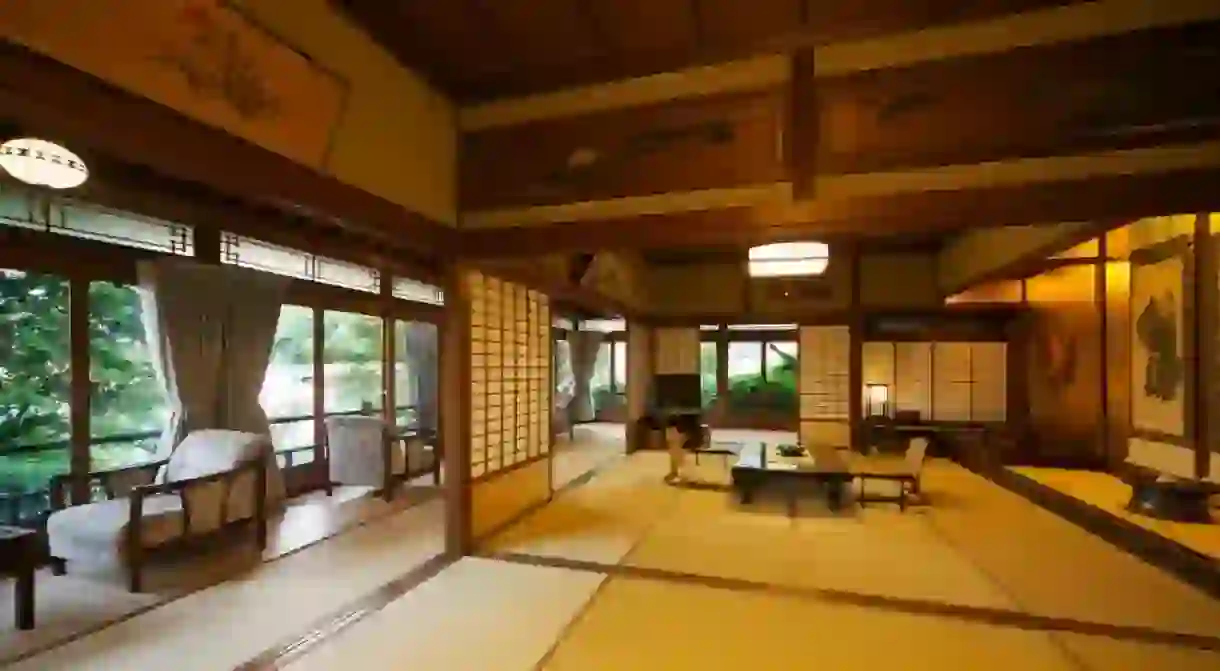How to Stay in a Traditional Ryokan in Japan

Ryokans in Japan come from a time when highway-bound merchants and officials suffered long, arduous journeys to reach distant parts of this 6,000-island country. After a day’s ride over mountainous terrain and through plunging river valleys, nothing felt more welcome than a ryokan: a traditional inn, where travellers could rest their weary head on a comfortable futon bed, be served a delicate meal to counteract all their on-the-road eating and soak horse-beaten bodies in healing hot waters. Today, ryokans maintain much of the same appeal. Here’s our guide to making the most of your ryokan experience – and our pick of the best ryokans in Japan, bookable on Culture Trip.
What to expect from a traditional ryokan stay
Stepping over the threshold of a ryokan – once your shoes are off, as is proper in Japan – transports you into a world of serenity, quiet and homely hospitality. Your host, the nakai-san, will greet you with a smile and show you to your room. No keycards or coffee machines here; simply an airy, minimalistic room that epitomises zen.
Don’t see a bed? Don’t be alarmed: the traditional, foldable futon is stashed away safely in a cupboard and your nakai-san will make it up for you later. The tatami mats that cover the floor add an extra spring to your mattress, so you’ll soon be destined for the land of nod.
Bounce over to the low table, deftly take a seat and sip earthy green tea as your host checks you in and asks you a few key questions to make your stay as pleasant as possible. “What time would you like to eat?” isn’t a casual invitation – if your stay includes meals, the chef wants to know when to expect you, so they can serve your food at its freshest. You’ll be treated to a full kaiseki banquet, each small plate more elaborate than the next. Seasonal and local foods, foraged in misty forests and fished from nearby rivers, come as standard.
You’ll want to slip into something more comfortable after dinner. Good news – a traditional yukata (casual kimono) awaits in your room. Wrap it over your body and wear it around the ryokan, the onsen, the neighbourhood – it’s appropriate for all occasions.
In fact, most ryokans have on-site onsen, where you can steam your stress away with a curative mineral bath like no other. Follow all the rules and you’ll never want to leave. Which, sadly, you will have to do at some point – wave goodbye to your nakai-san, put your shoes on and head out into the real world once more.
The best ryokans in Japan
Zaborin, Hokkaido
Ryokan, Luxury

The Kanji characters that make up Zaborin mean three things: “To sit, to forget, and to be in the woods.” At this ryokan hotel in Japan’s northernmost island, doing just that is encouraged. Blending seamlessly with the pine forest around it, each of Zaborin’s villa suites comes with both indoor and outdoor onsen baths, fed by volcanic water running beneath the hotel – the water quality is ranked in the national top 10%. After a dainty, modern interpretation of kaiseki – think treated venison slices and wild local mushrooms – retreat to the library and ease out an English translation of a Japanese classic.
Yunoshimakan, Gifu
Ryokan

You’ll be staying in halls graced by Japanese emperors past when you check in to this 1931-built ryokan in Gero Onsen, one of Japan’s premier hot spring resorts. The very definition of yin and yang, Yunoshimakan is a unique fusion of Japanese and Western architecture, with a piano-equipped ball and billiards room sitting harmoniously beside traditional Japanese footbaths – perfect for washing those feet after a birdwatching stroll through the cypress and cedar-filled grounds. Dine on Hida amago fish in your room, before being lulled to sleep by Japanese Alpine birdsong.
Kotohira Kadan, Kagawa
Ryokan

Situated on the slopes of Mount Zozu National Park, this inn feels sacred – with glowing floor lights and a pebbly zen garden setting the tone for a tranquil stay. Make a short pilgrimage to Kotohira Shrine, an homage to a local sea god – just 30 minutes walk up the mountain. When you’re back, savour a chilled session in the Garden Lounge’s massage chair, try a tipple of local beer, or test your mind with Mahjong. For something a little less sanctified, limber up your vocal cords in the ryokan’s karaoke room.
Nishiyama Onsen Keiunkan, Yamanashi
Ryokan

Keiunkan is the oldest ryokan in Japan and is even certified by the Guinness Book of World Records as the World’s Oldest Hotel. Dating back to 705AD, this riverside retreat deals exclusively in timeless simplicity, with plush zaisu (legless chairs) and scroll-adorned tokoyama nooks stationed in every paper-walled room. The communal baths offer an observatory feel, with wide openings onto the deep Hayakawa and Yukawa ravines. The calcium nitrate-filled waters will strengthen even the weariest of souls.
Yoshida Sanso, Kyoto
Ryokan

Ryokan are famed for their rural charm, so this family-run ryokan hotel in Kyoto is a rare find. Yoshida-Sanso is elegantly weaved into the fabric of a former Imperial residence and you’ll find the royal chrysanthemum imbued on towels, tiles and even door handles. Rooms overlook the ancient capital and mountains beyond, but if you don’t want to depart your hushed haven to experience Kyoto’s cultural pursuits, the green maple-filled garden regularly plays host to calming koto concerts. No wonder Yoshida-Sanso is a favourite among local monks.
For more options, see the best ryokan in Japan and book your stay with Culture Trip. Got a certain city in mind? Then see the best ryokan in Tokyo or the best ryokan in Kyoto.













